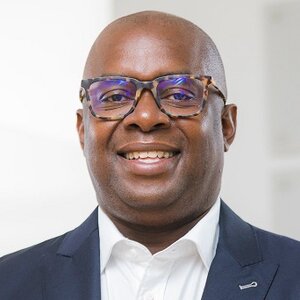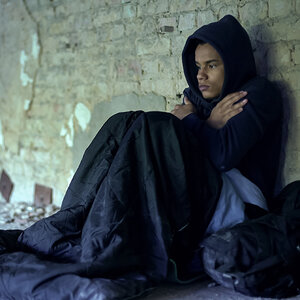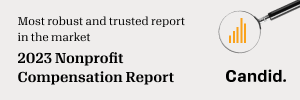Richard R. Buery, Jr., CEO, Robin Hood: When injustice makes you angry, you can do something about it
November 3, 2021
Richard R. Buery, Jr. succeeded Wes Moore as CEO of New York City-based Robin Hood in September, after serving as CEO of Robin Hood's community partner Achievement First, a network of thirty-seven charter schools in New York, Connecticut, and Rhode Island. He previously served as New York City's deputy mayor for strategic policy initiatives, in which he led Pre-K for All, which for first time offers free, full-day, high-quality PreK to every four-year-old in New York City; created School's Out NYC to offer free afterschool programs to every middle school student; launched two hundred community school partnerships; managed the city's mental health reform initiative; and founded the Department of Veterans Affairs and the Mayor's Office of Minority and Women-owned Business Enterprises. His experience in civil and nonprofit leadership also included stints as staff attorney at the Brennan Center for Justice at New York University School of Law, chief of policy and public affairs for the KIPP Foundation, and CEO of Children's Aid. He also co-founded Groundwork to support the educational aspirations of public housing residents in Brooklyn, as well as iMentor, which pairs high school students with mentors to help them navigate to and through college.
A first-generation Panamanian American born and raised in the East New York neighborhood of Brooklyn, New York, Buery is a graduate of Stuyvesant High School, Harvard College, and Yale Law School and clerked on the Federal Court of Appeals in New York.
PND spoke with Buery about worsening income inequality and the racial wealth gap, the impact of COVID-19 on the fight against poverty, the importance of equitable access to early childhood education and mental health services, and diversity among foundation and nonprofit leaders.
Philanthropy News Digest: You've held leadership positions with and/or founded numerous organizations focused on children and education — from the KIPP Foundation, Children's Aid, Groundwork, iMentor, and Achievement First to spearheading Pre-K for All and community-school partnerships. How did you come to devote your career to improving educational outcomes for underserved children?
Richard R. Buery, Jr: I think it stems from love and anger. I grew up in a low-income neighborhood in Brooklyn but was able to attend a high-performing specialized high school, Stuyvesant, in Lower Manhattan. Riding the subway for an hour each way between East New York and Stuyvesant, I realized there were two New York Cities — one where children have all the resources they need to succeed, and one where they don't. Why was I one of the lucky ones who got to attend a great public school, when so many other kids in my neighborhood who were just as talented and driven were sentenced to a second-tier education?
Experiencing those two New Yorks every day did something to me. It made me angry. But I got lucky. In college, I began volunteering at an afterschool program in the Mission Hill housing development in Roxbury, Boston. I fell in love with the children, the families, and the community. It reminded me of home. I wound up starting a summer program to support those children when school was out.
So, I think my career is grounded in anger and in love. My experience in Mission Hill taught me that when injustice makes you angry, you can do something about it. You can organize people, organize resources, and you can work with communities you love to help solve problems.
When injustice makes you angry, you can do something about it. You can organize people, organize resources, and you can work with communities you love to help solve problems.
PND: As a poverty-fighting organization, how is Robin Hood addressing the link between poverty and lack of educational opportunity?
RRB: At Robin Hood we take a holistic approach to education. We are focused on providing and expanding opportunities for high-dosage tutoring and accelerated learning in subjects like math and literacy, and we are working to better empower educators with high-quality curricula and training. But beyond the classroom, we are equally concerned about students' mental health, their physical well-being, and ensuring that every student has access to the essential basics of food and housing — all necessary for children to learn and excel.
We know that education remains the surest path toward economic stability. A person with a postsecondary degree can earn as much as $1 million more than a high school graduate over the course of a lifetime. It is not a coincidence that the communities with the poorest educational outcomes also have the poorest economic outcomes. And those outcomes can be tracked by race: 65 percent of New York City students of color do not read and write at grade level. So, we invest in quality schools and in the social support children and families need to be able to thrive in school. It is also important to invest in workforce development programs. That is why we invest more in educational support programs than any other issue area in our grant portfolio.
This is especially true as we emerge from the educational and economic devastation of the pandemic. Low-income communities and communities of color bore the worst of the crisis, including in education. The delayed learning, the mental health challenges, housing and food instability — all of these took the gravest toll on families who were already poorly served by our education system. Working with families to help get kids back to school and engaged in learning is critical to our poverty-fighting strategy.
PND: What do you see as the most effective ways of addressing the widening racial wealth gap in the United States? What role can philanthropy play?
RRB: Systemic racism is at the heart of the ever-widening racial wealth gap. The philanthropic sector must acknowledge and act on that fact. At the end of the day, the fight against poverty and inequality and the fight against systemic racism are deeply intertwined. You cannot effectively address one without addressing the other.
At Robin Hood we started out modestly and with humility. We have taken deliberate steps to look inward at how we do business. For example, we purposefully recruited and now have more BIPOC portfolio investment managers than we have ever had before. We are reexamining our grant portfolio to fund more organizations led by leaders of color. For example, our Power Fund has worked to identify and support twenty-five nonprofit leaders of color working against poverty in New York City. And we incubated a new initiative, NinetytoZero, that asks its partners to take deliberate, discrete actions to recruit, hire, grow, and support Black talent while also increasing capital flow to and engagement with Black-owned businesses. Although the initiative is still in its infancy, Goldman Sachs, American Express, McKinsey& Company, and others have signed on to join us in this effort.
The fight against poverty and inequality and the fight against systemic racism are deeply intertwined. You cannot effectively address one without addressing the other.
PND: In the face of the ongoing COVID-19 pandemic, which has exacerbated many existing inequities, the nationwide demonstrations for racial justice, and the political polarization, what are your immediate, short-term goals for Robin Hood?
RRB: We are focused on getting families back on their feet, kids back on track in school, and New Yorkers back to work. As New York City emerges from the pandemic, we must decide what kind of recovery we want. Do we want a recovery that disproportionately benefits some but excludes the most vulnerable New Yorkers from opportunity? That has been the blueprint too often in the past. Or do we want an equitable recovery, one where every family and every community shares fully in the benefits of that resurgence? That's the challenge facing New York, and that's what we want to support: an equitable recovery.
The COVID-19 pandemic has brought hardship on thousands of families and exacerbated already existing problems. The most vulnerable New Yorkers suffered much worse. They got sicker, and they were more likely to lose their jobs or have their education disrupted. As we face the new reality of life after the worst of the pandemic, we cannot just rebuild the exact same systems that already existed before but must address the problems that predate the pandemic. That involves committing funding to the programs and people in the communities hardest hit by the pandemic. But it is also an opportunity to elevate new voices and leaders, like what we are doing through our Power Fund. This is also a moment to make big bets on new approaches to the poverty fight that are home-grown by local leaders, such as the work we are doing through our Mobility LABS initiative — a four-year, $25 million pioneering effort to spur development of new solutions that can sustainably elevate families from poverty while promoting dynamic leaders who will seek to change the national conversation around social and economic mobility.
PND: In late August, Robin Hood's Fund for Early Learning (FUEL) launched FUEL for 50, which will award fifty nonprofits serving children ages 3 and under from low-income families with $25,000 in unrestricted funding, access to workshops and support, and opportunities for future funding. Can you share your thoughts about the importance of ensuring access to quality early childhood care and education?
RRB: As a parent myself, I can confirm that raising kids is the hardest job there is. And thousands of New York City families are taking on the hard work of parenting without access to basic services, housing, food, or income — challenges made even worse by systemic inequities and the COVID-19 pandemic.
During my time in City Hall under Mayor [Bill] de Blasio, I helped to launch PreK for All, which offers every four-year-old in New York City with a free full-day pre-kindergarten program, and launched 3K, which aims to do the same for younger kids. I helped launch initiatives to encourage mothers to read to their children, to support mothers of young children on Rikers Island, and to support the mental health of new parents.
I am especially excited that the Biden administration's Build Back Better Plan includes $400 billion for PreK, and I certainly hope Congress passes the plan, because if you follow the research, one will understand why we have prioritized early childhood. The first years of a child's life are critical to their lifelong learning and outcomes. The research is consistent and overwhelming. Quality early childhood experiences lead to significantly higher scores on intellectual and academic measures as young adults, more years of total education, greater likelihood of attending a four-year college, higher full-time employment, and lower likelihood of teen pregnancy or criminal legal system involvement or unhealthy behaviors.
That is the thinking behind FUEL. And these investments are especially important in a place like New York City, where nearly a quarter of the city's children ages 3 and under live in poverty. Robin Hood's vision is that all parents and caregivers have the resources they need to succeed and that all children have access to opportunities that help them reach their fullest potential. Not only will FUEL for 50 provide $25,000 in unrestricted funding to fifty nonprofits supporting parents and caregivers, but the initiative also offers opportunities for up to $1 million in future funding, along with support and access to professional development.
By directly supporting the city's parents and caregivers, we can positively impact the immediate and long-term economic mobility of our youngest children and, eventually, our communities at large.
PND: You mentioned a New York City initiative related to mental health, which has become especially urgent during the pandemic and particularly for young people. Is there a role for mental health initiatives in Robin Hood's anti-poverty efforts?
RRB: There is too much stigma around mental health. One in five New Yorkers will experience mental illness, and those New Yorkers have friends, family, and co-workers. That means mental illness affects everyone and everything. Yet, it is too difficult to find affordable and evidence-based care. We often turn to the mental health system only when someone is in crisis, and even then, we struggle to connect people to care. Access to those services and improvement in mental health can open a world of opportunities for those who seek to build a relationship, start a job, or learn skills on the road out of poverty.
As Americans have been isolated, lost loved ones, and struggled with job loss, food insecurity and homelessness, COVID-19 elevated the importance of mental health. National data indicates that from April to October of last year, the proportion of children's pediatric emergency room visits that were mental health related increased by almost a third for those ages 12 to 17, and 24 percent for children ages 5 to 11. Our children need help dealing with that trauma so they can lead healthy adult lives. Physical and mental health go hand in hand, and one's race, one's economic status, or one's ZIP code should not decide one's outcome.
During my tenure in the de Blasio administration, I managed First Lady Chirlane McCray's ThriveNYC initiative and saw the complexities and urgency for mental health services in New York City up close. At Robin Hood, mental health has become increasingly central to our work. For example, we are funding more mental health initiatives around maternal health, especially for Black and Latinx mothers who are more at risk for postpartum depression and other complications. We are also funding efforts to expand access to mental health services in schools in the communities hardest hit by COVID.
PND: As a longtime nonprofit executive of color, do you see efforts by philanthropic organizations to recruit and support leaders of color — both at the foundations themselves and at grantee organizations — as effective? Are there strategies or action steps that are being overlooked?
Expanding leadership to include more people of color, more people with lived experience with the challenges we seek to address, more people who understand and have credibility in the communities we serve, will help us to be better and more effective institutions.
RRB: Leadership in the philanthropic sector, like other American institutions, does not look like the communities we exist to support. That is a critical problem. Expanding leadership to include more people of color, more people with lived experience with the challenges we seek to address, more people who understand and have credibility in the communities we serve, will help us to be better and more effective institutions.
I am heartened to see more and more leaders of color at the helm of some of the country's storied philanthropies. We see that at big foundations like Ford and Mellon and at smaller organizations like the New York Foundation. But the sector has a long way to go. I can tell you that the problem is not a lack of talent.
PND: Given your wide-ranging experience as a staff attorney for an academic institute, a nonprofit leader, and as a deputy mayor, what would you like to see more of in terms of cross-sector collaboration?
RRB: [It's been said that] people live their lives horizontally but the systems in place to help those people are organized vertically. While in government, I led the Children's Cabinet, a group of service delivery departments that each had their own mandates, jurisdictions, and processes. I spent a large portion of my time helping departments work together — and not always successfully. Generally, our culture organizes safety-net services around bureaucracies and not around people. However, people have complex and intersecting lives, and it is a challenge for most families in need to traverse the byzantine structures that administer social programs. To steal a quote [from David K. Shipler], we make these systems so hard to navigate that being poor becomes a full-time job.
To address these challenges, we need systems and sectors to come together. We need governments to organize themselves differently. And we have to bring every institution to the table, including business, government, and nonprofits.
This presents an opportunity for philanthropy. By funding research, by supporting pilots, by amplifying success and failures, by fostering collaboration, we can help promote the cross sector and cross functional collaboration we need. The problems we face as a city and as a country are too big for any one institution or sector to solve alone.
—Kyoko Uchida





